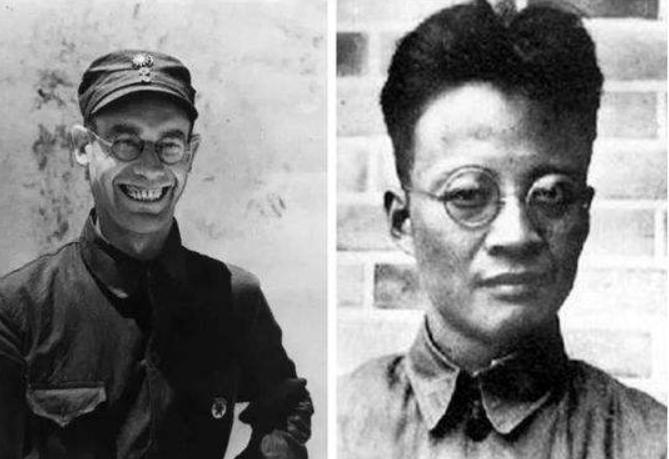The name Li De will not be unfamiliar to anyone who is slightly familiar with modern and contemporary Chinese history. His real name was Otto Braun, a German who, in his capacity as a military adviser, was in charge of military work in the Central Soviet Zone. During the Fifth Anti-"Encirclement and Suppression" campaign of the Central Red Army and in the early stages of the Long March, he adopted a series of strategies and tactics divorced from the actual situation, committed serious military mistakes, and caused heavy losses to the Central Red Army and the Chinese revolution. In the past, in many books and articles, Li De's identity was expressed as the military adviser of the Comintern stationed in China, but with the continuous disclosure of relevant materials and the continuous deepening of research, Li De's identity as a "military adviser to the Comintern" has been increasingly questioned.
According to official German materials, Li De was born in 1900 on the outskirts of Munich, Germany, participated in revolutionary activities while studying at the normal school, enlisted as a soldier in 1918, for less than a year, returned to school with the end of the First World War, joined the German Communist Party in 1919, participated in the workers' uprising and fought for the "Bavarian Soviet Republic", was arrested twice in 1921 and 1926, and successfully escaped from prison in 1928 after the second arrest. He fled to the Soviet Union and attended the Sixth Congress of the Communist International, entered the Frunze Military Academy in 1929, graduated in the spring of 1932, and came to China in the same year.

Why did Li De come to China, shi Zhe, who was working in the Comintern at that time and had long served as a Russian translator for the central leadership, said: "Li De worked in the Eastern Department of the Comintern, just as an ordinary staff member, and had a good relationship with Wang Ming. However, Li De's visit to China was not sent by the Comintern or the Chinese Communist delegation to the Comintern, but by the Soviet intelligence apparatus to do intelligence work in northeast China, and his main task was to deal with Japanese spies. Because at that time, the Japanese killed people in the northeast very casually, very cruelly, and killed suspicious people, Germany and Japan were allies, and Japan did not kill Germans. Therefore, the Soviet intelligence agencies sent Li De to the northeast. ”
After spending some time in the northeast, Li De accepted a new mission. Sorge, a well-known Soviet intelligence officer, established an intelligence system of the Far East Bureau of the Communist International in Shanghai, known as the Sorge Group. In October 1931, two members of the group were seized and arrested by the Kuomintang military and sentenced to death. Sorge learned that as long as the Kuomintang side had money to make a point, it could be considered separately, and from a wide haircut, he sent a secret telegram to Moscow, asking the Soviet Intelligence Headquarters to immediately send someone to send 20,000 US dollars to Shanghai to rescue the arrested comrades. This task fell to Li De and another member of the German Communist Party, and Li De came to Shanghai.
In Shanghai, Li De and Yurt, the representative of the Comintern in China, took over the head and established a working relationship with Bogu, Zhang Wentian and other central leaders. In the spring of 1933, as the Shanghai central government was preparing to move to the Central Soviet Zone, Bogu asked Yurt to send Li De as well. Regarding this request, the Comintern replied with the telegram, but explicitly instructed Li De to be a military officer under the leadership of Fred, the Comintern's military adviser in China, to understand and report the situation in a timely manner in the Soviet zone; Li De "had no command power" and had to obey the comintern delegation in Shanghai and its military adviser Fred. That is to say, Li De initially went to the Central Soviet Area as a liaison officer.
Since Bogu had no experience in leading armed struggle and had no prestige in the minds of the vast number of Red Army commanders and fighters, in order to subdue Chairman Mao and other actual leaders of the Party and the Red Army, he pushed Li De up and helped them to promote the "Left" line as a "Yang Qin cha", rejecting Chairman Mao's correct leadership, and making Li De the supreme decision-maker and commander in the central military field. On this point, Li De's translator Wu Xiuquan once emphatically pointed out: "Li De's power was not won by himself, but was handed over to him by the responsible person of the Central Committee, and the main responsibility for the failure should be the Chinese comrades themselves." ”
Wang Jiaxiang also doubted Li De's identity and mission. In the spring of 1937, he went to Moscow for medical treatment and questioned Wang Ming in person: "How did the Comintern decide that Li De went to China?" What did you and Reed talk about beforehand? Why rely entirely on Li De to direct military work? Wang Ming immediately declared: "I have not given instructions, the Comintern is not involved in this matter, but the Soviet Army Staff sent Li De." ”
The above-mentioned dialogue between Wang Jiaxiang and Wang Ming is consistent with Shi Zhe's recollection. It is enough to prove that Li De was not a military adviser sent to China by the Comintern, and that his later position in the Central Soviet Region, the golden sign of the so-called "Military Adviser of the Comintern", was promoted by Bogu.